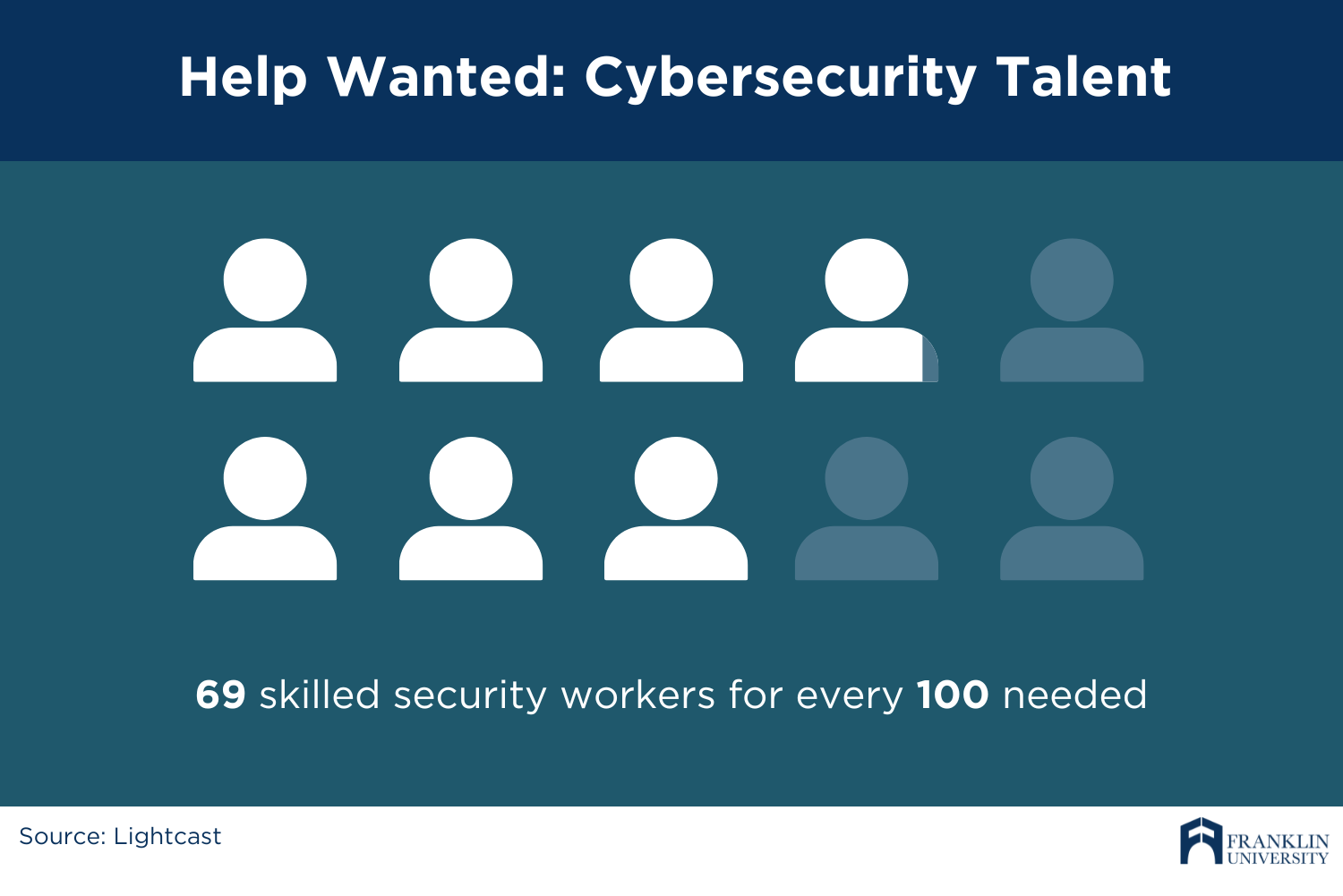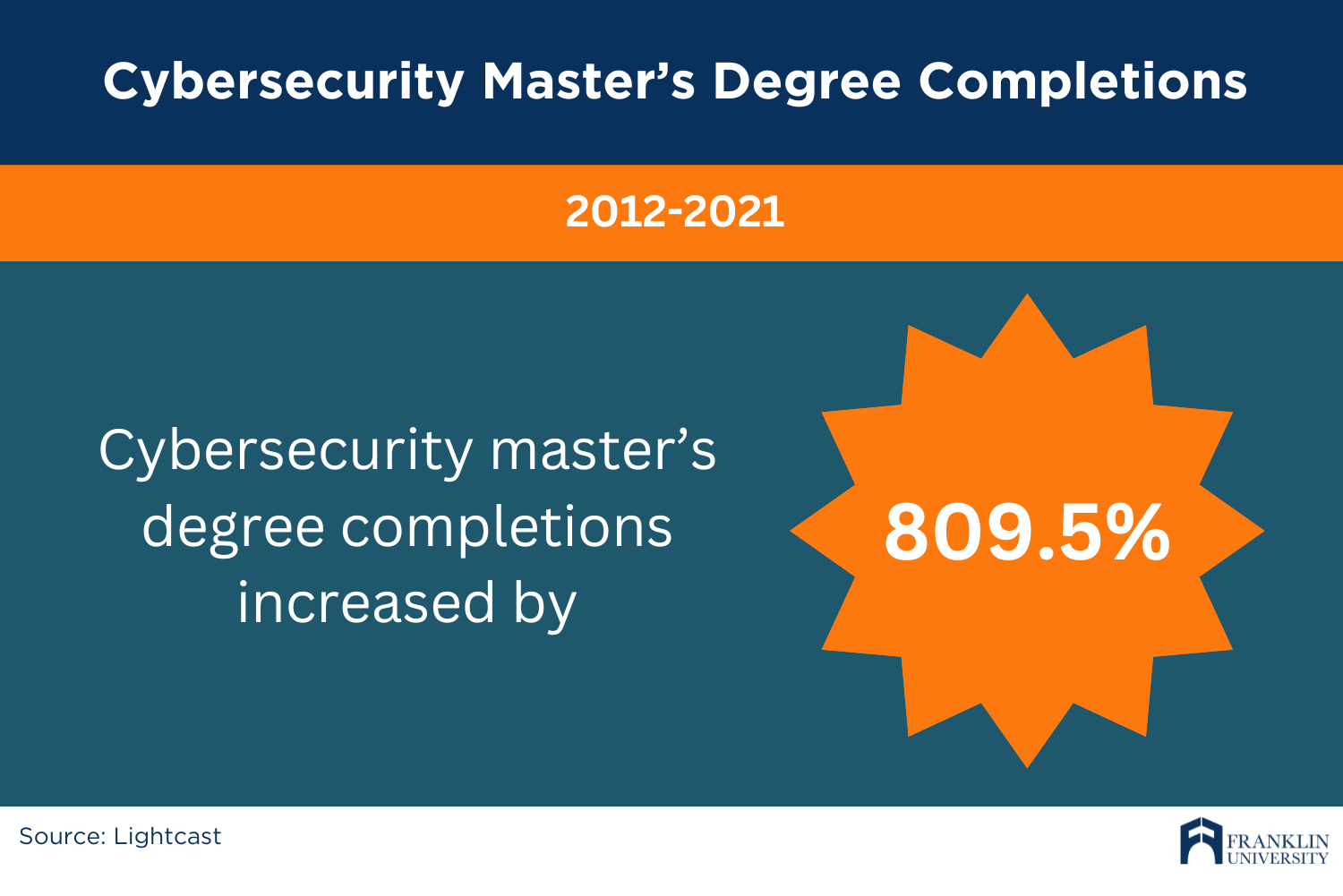Request Information
We're Sorry
There was an unexpected error with the form (your web browser was unable to retrieve some required data from our servers). This kind of error may occur if you have temporarily lost your internet connection. If you're able to verify that your internet connection is stable and the error persists, the Franklin University Help Desk is available to assist you at helpdesk@franklin.edu, 614.947.6682 (local), or 1.866.435.7006 (toll free).
Just a moment while we process your submission.

Can You Get a Master’s in Cybersecurity?
It’s hard to escape this reality: Everyone, including individuals and global organizations are at risk of a cyberattack. From email hacks to ransomware to cyberwarfare perpetrated by nation-states, cybercrimes are increasing in sophistication, frequency and impact.
In fact, according to the FBI’s 2022 Internet Crime Report, cybercrime losses totaled more than $10.3 billion annually in the United States.
This increase in cybercrime is wreaking havoc on critical infrastructure and networks, not to mention everyone’s bottom line. As a result, more companies and government agencies are desperately looking for savvy, well-trained cybersecurity professionals to defend them from malicious attacks perpetrated by cybercriminals.
Help Wanted: Cybersecurity Professionals Desperately Needed
According to the U.S. Bureau of Labor Statistics (BLS), demand for cybersecurity professionals is expected to grow 35% by 2031. (That’s considerably faster than the 3% growth rate projected for all occupations.)

What matters most when choosing a master’s program? Compare features, benefits and cost to find the right school for you.
And, according to labor market analytics firm Lightcast, there are some 660,000 job openings with only 69 skilled security workers for every 100 needed. Lightcast also says the nature of the field and the increased demand means that it takes 21% longer to fill cybersecurity jobs than other roles in IT.
This demand combined with a serious shortage of cybersecurity talent can only mean one thing: The field of cybersecurity offers excellent career growth potential.
And the best route to one of these high-paying jobs? A master’s degree in cybersecurity.
What Is a Cybersecurity Master's Degree?
A master’s degree in cybersecurity is an advanced degree that offers a targeted education beyond what’s typically offered in a cybersecurity bachelor’s degree, or in an undergraduate- or graduate-level computer science program.
“A master’s in cybersecurity affords students the opportunity to learn concepts, practice hands-on techniques, and better prepare for a career in the diverse field of cybersecurity,” says Denise Denise Bergstrom, Ph.D, CISSP, C|CISO, Program Chair, M.S. in Cybersecurity at Franklin University.
Surprisingly, though, though a cybersecurity master’s degree program requires a bachelor’s it may not require one in cybersecurity.
Who Should Earn a Master’s in Cybersecurity?
A cybersecurity masters is an excellent degree for any professional looking to enter the field or change their career. So, even if you’re a professional without a computer science background, you can gain the skills necessary to succeed in a cybersecurity masters degree program just by completing prerequisite coursework.
Plenty of people just like you are looking to earn a master’s in cybersecurity. The good news is, there’s room for all of you, given the growing demand for cybersecurity professionals.
Perhaps that explains why the completion rate for cybersecurity master’s degrees has exploded at what Lightcast reports is an astounding rate: 809.5% for distance-offered programs, 140.1% for non-distance programs, and 552.3% for all programs combined.

What Cybersecurity Skills Will You Learn in a Master’s Program?
Cybersecurity master’s degrees can provide a deeper understanding of the field. A high-quality online degree program will include engineering- and management-level cybersecurity topics, theoretical and applied cybersecurity domains, and offensive and defensive approaches. In addition, the best online master’s in cybersecurity programs also aligns with industry-leading certifications, such as CISSP, CISA and CISM.
You should expect your cybersecurity master’s degree program to teach you how to:
- Evaluate organizational security and identify specific risk areas
- Identify and model threats during the software development process
- Recommend and implement cryptographic algorithms and systems to preserve data integrity and confidentiality
- Defend infrastructure against common threats and attacks, such as viruses, hacks and phishing
- Ensure compliance with data security requirements and regulatory mandates
- Assess network security at all levels, including protocol, device, operating system and application
- Develop and manage security policies and procedures
Should I Get a Cybersecurity Certificate Instead of a Master’s?
Only you can decide if you want to pursue a master’s degree in cybersecurity or a shorter certificate program, but here’s some information about the differences that may help you be more confident in your final decision.
ROI
A certification program in cybersecurity usually focuses on a particular topic, like cyberdefense or governance. Certificates typically take a few months to complete and are often valid only for a period of time.
A master’s degree program, on the other hand, takes at least a year to complete. It covers many different aspects of cybersecurity and, upon completion, is something you hold for a lifetime.
Program Approach
In answer to the question, Should I get a cybersecurity certificate instead of a master’s degree? Dr. Bergstrom says, “It depends. If you already have a degree in IT or cybersecurity and you don’t need a degree but just need to update your skills and knowledge to attain the position or positions you desire, then a certificate could be for you. Certificates let you focus on a subject without any additional courses in complementing subjects. This allows those who need a fast approach to applying new knowledge to have a means outside of a degree.”
Skills
The foundational knowledge that comes from a master’s degree also can prepare you to adapt quickly in this fast-changing field. Programs like Franklin’s intentionally include a capstone project in which students research emerging cybersecurity trends.
With a deep understanding of the principles behind the various cybersecurity strategies and tactics, students build the skills needed to address the hallmarks of cybersecurity: changing and emerging threats.
“A master’s degree provides the same courses as a graduate certificate,” explains Dr. Bergstrom, “but it also includes additional courses in complementing topics, giving you the opportunity to take a deeper dive into the field of cybersecurity. Determining whether to choose a certificate or a master’s degree in cybersecurity is usually based on your goal or plan for how you’ll use it. If, for example, you already have a graduate degree, you may want to opt for the certificate to show currency in the subject matter. On the other hand, if you only have an undergraduate degree, a graduate degree in cybersecurity is a significant credential for a career in the field.”

Start or Advance Your Cybersecurity Career
The thing to remember is that with the right program and a few prerequisites you don’t have to have experience or a background in cybersecurity to enter this top-paying, in-demand field.
And, if you’re already working in cybersecurity, you know that staying ahead of emerging trends is part of staying ahead of cyberattackers.
So, whether you’re just entering the field or ready to move up in your cybersecurity career, a master’s in cybersecurity can put you on the right path.
Are you up for the challenge of defending companies, governments and individuals from cyber threats? Learn more about why a master’s degree in cybersecurity might be right for you.





